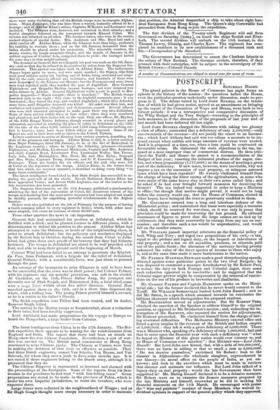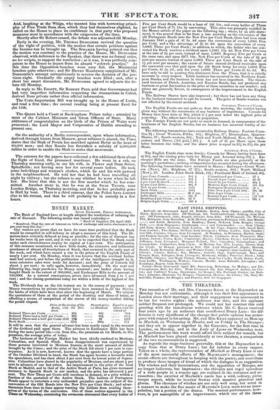POSTSCRIPT.
SATURDAY NIGHT.
The grand palaver in the House of Commons last night forms an episode in the history of the session : the questions before the House, even the particular question technically under discussion, made no pro- gress in it. The debate raised by Lord Jonw Russr.m. on the resolu- tion of which he had given notice, moved as an amendment on bringing up the report of the Committee of Ways and Means, went back to two former periods : it was a retrospective and comparative discussion of the Whig Budget and the Tory Budget—recurring to the principles of both measures as if the discussion of the proposals of last year and of last month had been deferred till last night.
Lord Joust RUSSELL charged the Ministers with taking too gloomy a view of affairs; contended that a deficiency of only 2,500,000/.—only one-twentieth of the revenue—did not justify the resort to an Income- tax ; which Lord Althorp had said was too odious a measure to be im- posed except when sudden and large amounts of revenue were needed. And it is proposed at a time, too, when a loan could be contracted on favourable terms. He elaborated the main objections to the tax, im- posed at a most improper time of commercial distress. He then criti- cized the Tariff ; and thence he passed to a recommendation of the Budget of last year ; vaunting the estimated produce of the sugar, tim- ber, and wheat propositions (1,717,0000 as the means of meeting a great part of the deficiency. If new taxes, however, were inevitable, why not impose a tax on the succession of real property, or reimpose assessed taxes which have been repealed? He warmly vindicated himself from the charge of being the bitter enemy of the agriculturists, as some who were made of the same heavy clay as their own acres called him ; and be asked if he had ever brought forward measures for deceiving the farmer? The tax indeed was supported in order to keep a Ministry in office; but though that motive might prevail, it would not be long before the country would say, that the House of Commons, elected in other hopes, have betrayed the trust so generously confided to them.
Mr. Gouraimor entered into a long and laborious defence of the Ministerial policy ; and maintained that loans were especially a recourse which should be reserved for war-time, as it was only in peace that provision could be made for recovering the lost ground. He adduced statements of figures to prove that the large estates are so tied up by settlements that they must necessarily be exempt from any tax on suc- cession • and therefore such a tax would be unproductive, and would fall on the smaller estates.
Mr. WILLIAMS passed impartial strictures on the financial policy of both Whig and Tory ; and urged two propositions of his own,—a tax, equal to the probate and legacy duty, on the bequest or inheritance of real property ; and a tax on all annuities, pensions, or stipends, paid out of the public funds ; the alteration of the currency having greatly enhanced the value of the latter species of income to those who enjoy it, and at the same time made it more burdensome to the nation.
Mr. PATRICK MexwELL STEWART made a good sharpshooting speech, directed against some particular points in the two rival Budgets: he was disposed to commend a measure foreshadowed by Sir Robert Peel, to reduce the duty on both Foreign and Colonial sugar, since some such reduction appeared to be inevitable ; and he suggested that the Colonial sugar-grower might be compensated by the removal of restric- tions on the use of his produce in breweries and distilleries.
Mr. GEORGE PALMER and Captain Ba3uvrox spoke on the Minis- terial side ; but the former declared that he never would consent to the Tariff. Sir WILLIAM SOMERVILLE backed Lord John Russell ; and so did Mr. Sault, in a speech which assumed towards its conclusion the brilliant character which distinguishes his prepared orations.
Mr. BROTHERiON moved an adjournment. But Sir ROBERT PEEL obtained the sanction of the Speaker to address himself to the original question, as opposed to Mr. Brotherton's motion ; and, unheeding the in- terruption of Mr. BLEwrrr, who repeated the motion for adjournment, Sir ROBERT proceeded. He vindicated himself from the charge of hav- ing overrated difficulties. The Melbourne Ministry entered office and found a gross surplus in the revenue of the British and Indian empire of 3,000,0001.: they left it with a gross deficiency of 5,000,0001. There was a Minister who, speaking of a deficiency of only 1,000,0001., had said that to enter upon the financial year with such a deficiency was "what he hoped no Minister of this great nation would ever consent to, and no House of Commons ever sanction ": that Minister was—Lord John RusseJil But Lord John now hinted, that, with a debt of 800,000,000?., there was no harm in adding to that so small a sum as 2,000,0001. "Do not deceive yourselves," exclaimed Sir Robert : look to the disaster in Afghanistan—the wholesale slaughter, unprecedented in our history—its moral effect on the people of India, as yet un- known; and look to the exertions which must be made to retrieve that disaster and maintain our influence. But Lord John talked of a legacy-duty on real property : would the late Government then have supported it? Mr. Baring himself declared it to be a delusive measure. Sir Robert went on to examine the finance measures proposed by the late Ministry and himself, somewhat as he did in making his financial statement on the 11th March. He encouraged with praise the" wise and patriotic" conduct of those Members who waived in- dividual opinions in support of the general policy which they approved.
And, laughing at the Whigs, who taunted him with borrowing princi- ples of Free Trade from them, which they had themselves slighted, he called on the House to place its confidence in that party who proposed measures most in accordance with the exigencies of the time.
Shortly after Sir Robert ceased, the debate was adjourned till Monday.
Early in the evening, Mr. THOMAS DUNCOMBE revived the question of the right of petition, with the motion that certain petitions against the Income-tax be brought up. The SPEAKER having pointed out that the motion was contrary to the practice of the House, Mr. DUNCOMBE observed, with deference to the Speaker, that there was no formal order, no lex scripta, to support the restriction as it was, it was perfectly com- petent to the House to depart from its absurd "cobweb practice." At this time the Opposition-benches were very full, the Ministerial benches quite otherwise ; and Sir HENRY HARDINGE complained of Mr. Duncombe's attempt surreptitiously to reverse the decision of the pre- vious night. Gradually the empty benches were filled ; and, after a short but smart discussion, Mr. Du/mom:1E agreed to adjourn the de- bate till Monday.
In reply to Mr. Escarr, Sir ROBERT PEEE said that Government had had very imperfect information respecting the transactions in Cabul, derived from private rather than official information.
The Corn-Importation Bill was brought up in the House of Lords, and read a first time ; the second reading being at present fixed for the 15th.



























 Previous page
Previous page